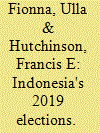|
|
|
Sort Order |
|
|
|
Items / Page
|
|
|
|
|
|
|
| Srl | Item |
| 1 |
ID:
169228


|
|
|
|
|
| Summary/Abstract |
In April 2019, Indonesia carried out simultaneous presidential and legislative elections. With an estimated 192 million voters acceding to 800,000 polling stations, this was the world's largest direct presidential election. Barring some dispersed claims of irregularities, the mammoth task of electing public representatives at the national as well as provincial and local levels was successfully carried out. Indonesia's voters had to decide on the 575 members of the national parliament, as well as some 20,000 seats in the country's many provincial and local legislatures, including 2,207 provincial level MPs from 34 provinces and 17,610 local councillors from more than 500 local authorities. Voter turn-out was an estimated 81.9 percent, the highest yet since Indonesia's transition to full democracy. Thus, at first blush, this electoral exercise can be seen as a logistical and political achievement, and an addition to Indonesia's track record of successfully-held elections. Yet, despite its technical proficiency and solid participation, the 2019 polls highlight pervasive societal and geographic fault-lines and raise questions about the strength of Indonesia's democratic institutions.
In order to analyse the importance of these elections, this article is comprised of six parts. Following this introduction, the second section briefly discusses the salient aspects of Jokowi's first administration. The subsequent part sets out the run-up to the presidential campaign, paying particular importance to changes in ‘rules of the game’ that altered the structural dynamics of the elections. The fourth section compares and contrasts the campaigns of the two opposing coalitions and the fifth analyses the electoral results. The final section concludes by discussing the denouement of the elections before looking forward.
|
|
|
|
|
|
|
|
|
|
|
|
|
|
|
|
| 2 |
ID:
137618


|
|
|
|
|
| Summary/Abstract |
Indonesia’s new president, Joko Widodo, is new to foreign affairs and seemingly has little interest in diplomacy, a marked contrast with his predecessor Susilo Bambang Yudhoyono, who sought a role as an international statesman. Instead, Jokowi — as he prefers to be known — has declared that he will focus on domestic affairs as part of a broad reform programme, with a particular emphasis on strengthening Indonesia’s maritime infrastructure and reasserting the authority of the state. However, an activist presidency in these areas, even if intended only as a domestic effort, will create unintended foreign policy challenges for Indonesia because the country’s economic and maritime interests are so closely intertwined with those of its neighbours. This article examines Jokowi’s statements on foreign affairs, offers a survey of his foreign affairs advisers and places the president in the country’s historical and political context. It then examines potential flashpoints in Indonesia’s relationships with its neighbours over Jokowi’s agenda. It argues that under Jokowi, foreign policy is likely to become less clear, less conciliatory and less cooperative, with negative consequences for Indonesian leadership in the region.
|
|
|
|
|
|
|
|
|
|
|
|
|
|
|
|
|
|
|
|
|